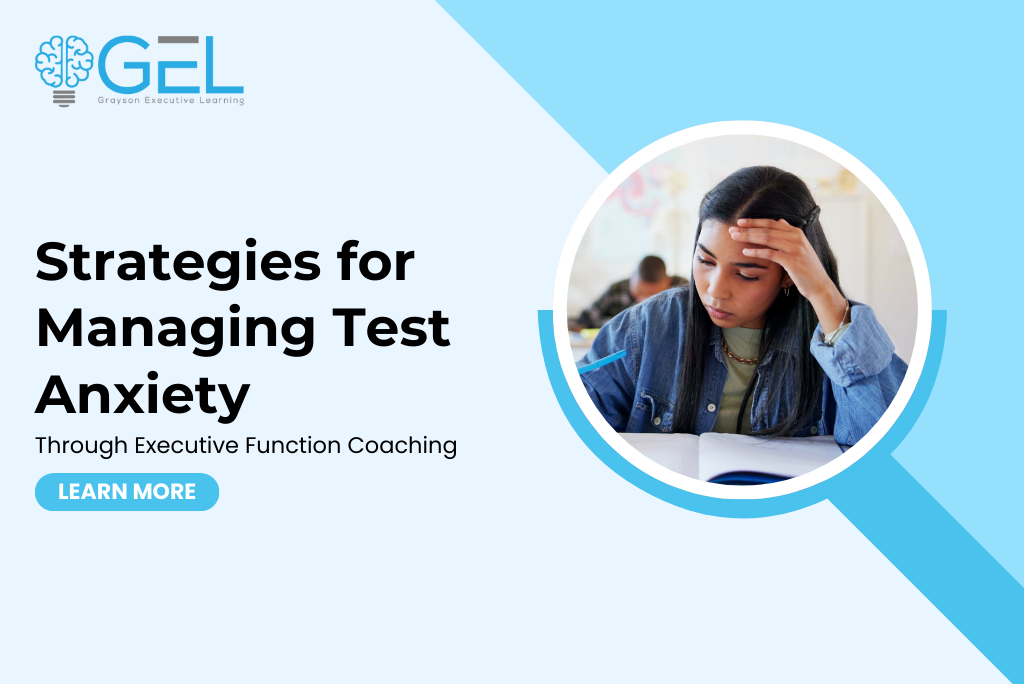Your teen has studied for days, the flashcards are worn at the edges, and the review packet is covered in highlighter. Yet on the morning of the exam, you can almost feel the tension radiating across the kitchen table. Their shoulders inch toward their ears, breakfast sits untouched, and the phrase “I’m going to blank out” tumbles out between shallow breaths.
If this sounds like your household, you are not alone. Research shows that roughly one in five students experiences significant test anxiety and among high-achieving high-schoolers the proportion is even higher. When anxiety peaks, the body releases cortisol, a stress hormone that can literally block the neural pathways needed for working memory and recall. In other words, even well-prepared students can find themselves paralyzed at the very moment they need their brains to perform.
The truth is: test anxiety is not a character flaw and it is not permanent. With the right executive function (EF) tools and a purposeful coaching plan, your teen can learn to regulate their stress response, retrieve information efficiently, and walk into exams feeling calm and competent.
What Makes Test Anxiety Different from Ordinary Nerves?
A quick surge of adrenaline before a quiz is perfectly normal. In fact, a little stress can sharpen attention. Psychologists call this the Yerkes–Dodson curve: performance rises with arousal up to an optimal point and then drops when stress becomes overwhelming.
Test anxiety pushes students past that optimal point. Symptoms show up in three interconnected ways:
- Physical: racing heart, sweating, nausea, headaches, shaky hands
- Emotional: feelings of dread, panic, hopelessness
- Cognitive: racing thoughts, blanking out, negative self-talk
When cortisol levels stay elevated, the prefrontal cortex, the brain’s EF command center struggles to manage time, shift attention, and retrieve stored facts. That is why building stronger EF systems is one of the most effective paths to calmer testing experiences.
Executive Function Skills at the Core of Calm Test-Taking
Executive function refers to a family of mental skills that help us plan, organize, initiate tasks, monitor progress, and regulate emotions. The three most test-relevant EF categories are:
- Planning and Organization
Breaking material into manageable chunks, mapping study time, and arranging resources. - Working Memory and Cognitive Flexibility
Holding information in mind, manipulating it, and shifting between question types. - Emotional and Attention Regulation
Recognizing rising anxiety, steering attention back to the task, and employing calming techniques.
Strengthening these skills through guided practice rewires the stress response and empowers students to show what they know under pressure.
Eight Research-Backed Strategies Your Teen Can Start Today
Each technique below targets one or more EF domains and has been adapted for busy high-school schedules. Encourage your teen to experiment and note which tools feel most natural.
1. The Physiological Sigh
EF focus: Emotional Regulation
A rapid reset for runaway nerves. Inhale through the nose until the lungs are almost full, pause, take one shorter sip of air, then exhale slowly through the mouth until empty. Two or three cycles calm the autonomic nervous system and lower cortisol within seconds.
Try it: Before opening the test booklet, two silent sighs can replace frantic last-minute scrolling.
2. Box Breathing
EF focus: Attention Regulation
Inhale for four counts, hold for four, exhale for four, hold for four. The rhythmic pattern anchors attention and prevents catastrophizing thoughts.
Try it: Practice during homework sessions so it feels automatic on exam day.
3. Grounding Through the Five Senses
EF focus: Cognitive Flexibility
When “what if” scenarios spiral, guide the brain back to the present by naming:
- 5 things you can see
- 4 things you can hear
- 3 things you can feel
- 2 things you can smell
- 1 thing you can taste
This quick sensory scan interrupts rumination and reopens the pathway to the prefrontal cortex.
4. Two-Column Thought Reframes
EF focus: Metacognition and Emotion Regulation
On the left side of a page, write anxious thoughts (“I will fail”). On the right, counter with a balanced statement (“I have prepared for two weeks; one grade will not define me”). Over time, this trains the brain to shift from catastrophic predictions to evidence-based reasoning.
5. Progressive Muscle Relaxation
EF focus: Self-monitoring
Starting at the toes, gently tense each muscle group for five seconds, then release for ten. Physical relaxation signals safety to the brain, allowing working memory to function.
Try it: Pair with a study break playlist. One song length relaxes the entire body.
6. Visualization Rehearsal
EF focus: Planning and Working Memory
Athletic coaches use mental rehearsal to improve performance; students can too. Have your teen picture walking into the exam room, breathing steadily, reading each question, and recalling answers. Imagery primes the neural circuits they will rely on during the real event.
7. Task-Backward Study Scheduling
EF focus: Planning and Time Management
Instead of a vague goal like “study biology,” work backward from the test date:
Posting the schedule visually reduces last-minute cramming – a chief trigger for anxiety.
8. Mock-Test Exposure with Recovery Breaks
EF focus: Cognitive Flexibility and Stress Tolerance
Simulate real conditions (timer, quiet room, no phone). After each short mock quiz, insert a deliberate recovery technique (sigh, box breathing, stretch). This pairing teaches the nervous system that stress is followed by relief, reducing fear during the actual exam.
How Parents and Educators Can Help
When it comes to building executive function skills, your steady presence is one of the most powerful safety signals a student can have. Teens and young adults look to the adults around them for cues about how to handle challenges, regulate emotions, and stay organized under pressure. By weaving small, intentional practices into everyday routines, you can help create an environment where executive function skills can truly take root and grow. Here are some simple, effective ways to make that happen:
Coach the Plan, Not the Outcome
Ask open-ended questions:
- “What is your first step?”
- “Which chapter feels most challenging?”
This prompts planning skills without adding performance pressure.
Model Calm Self-Talk
Let your teen overhear you reframe your own stressors. “I have a big deadline, but I’ve made a checklist and I know I can tackle it.”
Protect Sleep and Nutrition
Seven to nine hours of consistent sleep and balanced meals rich in omega-3 fatty acids support working memory and emotion regulation. Students who sleep well recall up to 40 percent more information the next day.
Celebrate Process Wins
Praise effort: “I noticed you started studying a week early.” Recognition of strategic behaviors reinforces the EF habits that neutralize anxiety.
Collaborate With Teachers
If anxiety interferes with class performance, discuss accommodations such as extended time or a quieter testing space. When students feel supported, cortisol drops and confidence rises.
When to Seek Professional Coaching
Some students benefit from targeted, one-to-one guidance. Consider executive function coaching if your teen:
- Regularly studies hard yet scores far below their practice work
- Experiences physical panic symptoms before most assessments
- Avoids test days or frequently requests to leave school early
- Spends excessive time rechecking work due to perfectionistic fears
What Happens in a GEL Coaching Session?
At Grayson Executive Learning, we pair evidence-based mindfulness tools with structured EF skill-building.
- Assessment: We map current habits, anxiety triggers, and learning strengths.
- Personalized Roadmap: Together, we set concrete, measurable goals (for example, “complete math study plan three days before the test”).
- Skill Rehearsal: Coaches practice breathing, visualization, and scheduling techniques in real time so they become automatic.
- Reflection Loop: After each assessment, our students analyze what went smoothly and choose one micro-adjustment for next time.
- Parent Partnership: You receive periodic progress notes and simple prompts to reinforce new habits at home.
Over 12 weeks, most students report a 25 to 40 percent drop in self-rated test anxiety and a parallel rise in homework efficiency.
Final Thoughts
Test anxiety can feel like an impenetrable wall, but neuroscience tells a more hopeful story. Because executive function skills are malleable, your teen can learn to regulate their body’s stress response, organize study time, and approach exams with a calm mind. The eight strategies in this article, from the physiological sigh to mock-test exposure, are a powerful starting toolkit. When those tools are paired with compassionate coaching and steady parental support, students do not just survive test day; they grow into confident, self-directed learners.
Ready to see your teen trade panic for poise?
Grayson Executive Learning (GEL) is a boutique Academic and ADHD\Executive Function Coaching practice that specializes in providing premium one-on-one academic coaching services to high school and college students with ADHD and executive function difficulties.
Click here to learn how we can help your student truly reach their academic potential while developing critical life and independence skills.
We look forward to serving you!


